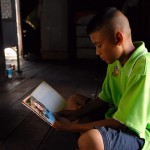J. R. R. Tolkien popularized the concept of humans acting as “sub-creators.” God is the master Creator, and we are made in his image, bearing his likeness by representing him and following his example in cultivating and caring for the world. When we use the gifts God has given us to create new things, we are imitating God’s creative work, obeying the first commands he gave Adam and Eve and glorifying Him by pointing back to Him as the original Creator. Tolkien applied this to writing fantasy stories, but it applies in some ways to all creative, productive work that humans do.
Creation is tied to ownership. God owns us because He made us, and while He has given humans a degree of stewardship over our bodies and the world around us, He retains ownership of it all. When we act as sub-creators, it’s appropriate to recognize a degree of ownership over the work of our hands and minds. That’s what patent and copyright laws are made to protect—they ensure others don’t steal what we have made. But the things that God has made and given to all people can’t belong to any individual or corporation.
The U.S. Supreme Court issued its ruling this week in a patent case that echoes Tolkien’s notion of humans as sub-creators. It was expected to have far-reaching implications for the development of biotechnology and genetic therapy in the States—not to mention the evolving and hotly debated U.S. patent system. The case arose when the Association for Molecular Pathology, an association of researchers and activists, sued the biotech firm Myriad Genetics over Myriad’s patent of two human genes that are linked to breast cancer. Myriad developed a test for these genes that can help women assess their risk of developing breast cancer, and they filed a patent on the genes in an attempt to prevent others from capitalizing on their work. AMP sued to have the patents declared invalid.
The Supreme Court ruled unanimously this week, siding with AMP and declaring Myriad’s patents on the breast-cancer genes invalid. In the opinion, written by Justice Thomas, the Court affirmed the longstanding principle of patent law that naturally occurring phenomena cannot be patented and that Myriad didn’t create anything new when it discovered the genes and developed the process to test for them. The court left open the possibility of patenting DNA strands that are artificially created or modified in the lab, but those that are a natural part of the human body are not eligible for patent protection.
This seems a fairly straightforward and uncontroversial idea: What’s common to everyone shouldn’t be owned by or protected for the benefit of any special group. While the Court’s opinion drew mostly on standing law and precedent, the principle at stake is one that reflects fundamental Christian assumptions about the world as God’s creation and humans’ place in it.
Trying to patent a portion of the human genome would be a bit like someone claiming ownership of sunlight and trying to charge everyone to use it for growing their crops and heating their homes. An individual or a corporation can’t own sunlight or the human genome, because God created them and owns them, and no one can assert exclusive rights to them because God has given them to be shared by everyone.
As my fellow CAPC writer S. L. Whitesell observed when we were discussing this, it’s nice when positive law (the law that’s on the books) reflects natural law (the laws of the way God’s world works). It’s encouraging to see, especially in an era where positive law seems to be trending in the opposite direction. While the Supreme Court probably didn’t have natural law or humans’ responsibilities to God in mind when they issued this ruling, it’s a good reminder that the patterns and structures God has built into the world are part of all of us, whether we recognize them or not.
photo credit: Alfred Hermida via photopin cc











